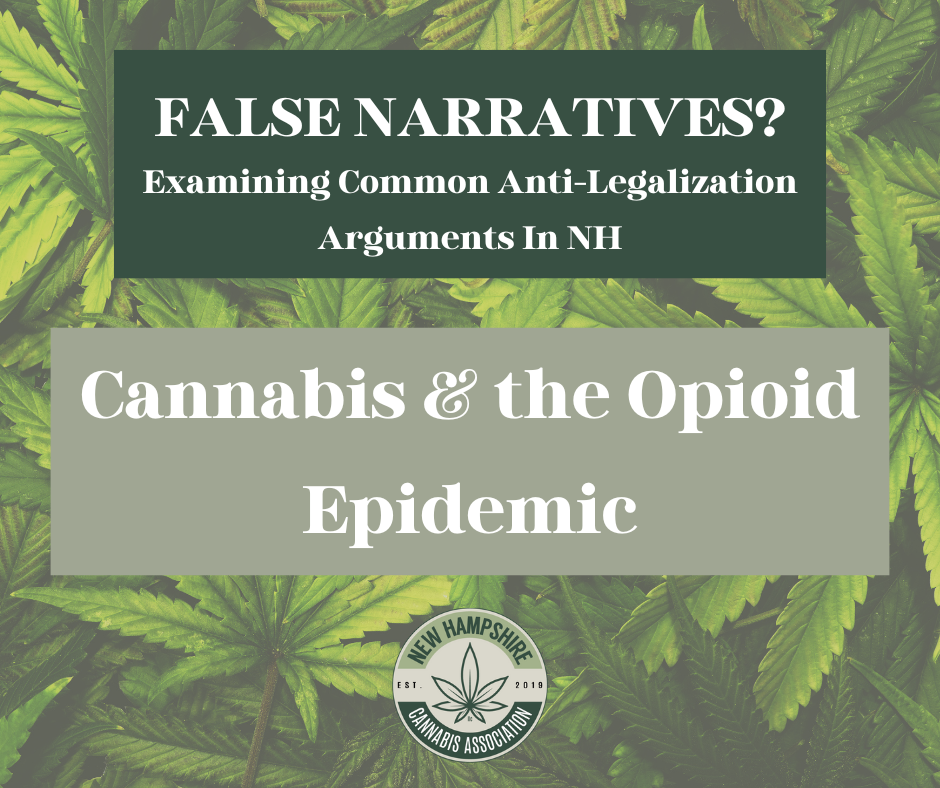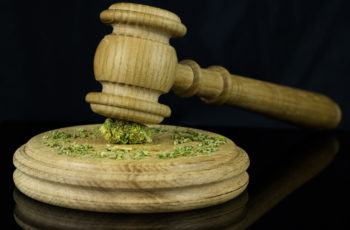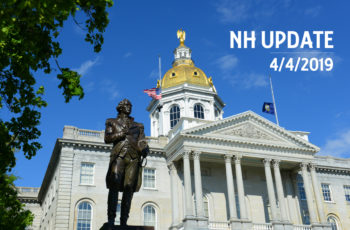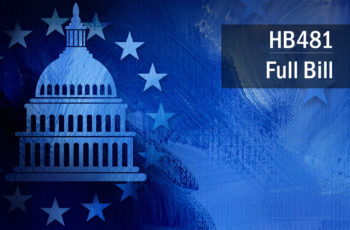False Narratives?: Examining Common Anti-Legalization Arguments in NH
If you have been paying attention to cannabis legalization efforts in the Granite State over the past few years, it is painfully obvious that one of the most significant barriers to successful reform has been the Senate.
Year after year, the House (in alignment with general public opinion) routinely passes cannabis legalization bills, only for them to then die a painful death in the upper Senate chamber due to either (1) a lack of correct information, (2) misinformation, (3) straight up catastrophizing the negative consequences of legalization, or (4) some general combination of all three.
As such, we here at the NH Cannabis Association feel that it is important to try to provide information and research as a means of countering, and hopefully, dispelling those anti-legalization arguments.
Argument #1: The Opioid Epidemic in NH
Admittedly, this argument against legalization is rather silly considering that in 2021 NH signed into law a bill that added opioid use disorder as a qualifying medical condition for the state’s Therapeutic Cannabis Program—but, alas, here we are.
The fear driving this argument is generally tied to the old, debunked myth that cannabis is a “gateway drug” that will only lead toward more harmful illicit drugs like heroin, meth, and cocaine, or that it could lead to the abuse of prescription opioids.
To the contrary, continued research indicates that cannabis access and use can be a contributing positive factor in combatting the opioid epidemic in the US. As the leading non-profit organization in the US dedicated to the legalization of cannabis, the Marijuana Policy Project (MPP) argues that allowing for cannabis access can steer people away from the use of prescription opioids for chronic pain management in the first place, and also can aid in the reduction of prescription opioid abuse and lower rates of opioid overdose fatalities (MPP: Access to Marijuana Can Help Fight the Opioid Epidemic).
As for the scientific side of the equation, cannabis research scientist Dr. Riley Kirk of Real Isolates, LLC, provides the following insights:
“There has been considerable research in the use of Cannabis for people suffering from addiction or withdrawal symptoms from opiates. The system in the body that cannabis interacts with, called the endocannabinoid system helps to regulate all other systems in the body including the opiate/endorphin system.1,2 The interplay of these systems in the brain can help people suffering from withdrawal symptoms by modulating the levels of neuronal activity. Cannabis does activate the addiction pathways in the body like an opiate and has not been linked with any increase in opiate usage or money spent on opiate drugs.2
There is no question that the opioid epidemic has been catastrophic for young people throughout this country. As the numbers continue to grow it is important to look at what factors have been linked to decreased instances of death. One such factor that has shown a decrease in opiate use over time has been the legalization of cannabis. One study published in a prestigious medical journal JAMA noted a 25% decrease in opiate related deaths in the 13 states that had legalized Cannabis within the past six years, a significant decrease compared to states that had yet to legalize.3 While complete abstinence from all substances is likely the most helpful on the recovery journey from opiates, it is not a practical approach and some patients find cannabis to be a helpful tool to get and stay clean over time. The current drugs that are administrated to help patients with withdrawal symptoms are also not risk-free nor successful in all patients and there are simply not enough resources to get this medicine to everyone who needs it.4 Cannabis is a harm reduction tool while coming off opiate drugs. Patients who were withdrawing off opiates that used cannabis intermittently showed better retention other treatment groups, likely by alleviating the withdrawal effects.5
Cannabis is not addictive in the ways that opiates are addictive in our body, they do not activate the same reward system. Many people have found cannabis helpful as their brains recover from opioid addiction, the painful feelings of withdrawal, and adjusting to life after opiate addiction. The current system we are using to help our community is not working and cannabis has shown to be effective and does not worsen the opioid crises, rather evidence suggest it may help it.”
While the above information is only a small slice of the ever-expanding body of information and research regarding cannabis and the opioid epidemic, we hope it can provide guidance to both advocates and legislators in NH in the coming weeks as the Senate decides whether or not to legalize cannabis in the Granite State.
Here are some additional cannabis & opioid use disorder resources:
- NORML: Marijuana Legalization Associated with Less Use of Prescription Opioids, Review of Longitudinal Studies Concludes
- Scientific American: Cannabis Could Help Solve the Opioid Crisis
- University of Pittsburgh – Health Sciences: Legalized Marijuana Linked to Decline in Opioid Emergencies
And for those interested in learning more about cannabis science and research, check out the work of Dr. Riley Kirk by heading over to her Instagram: @cannabichem
References:
1Desroches J, Guindon J, Lambert C, Beaulieu P. Modulation of the anti-nociceptive effects of 2-arachidonoyl glycerol by peripherally administered FAAH and MGL inhibitors in a neuropathic pain model. Br J Pharmacol. 2008 Nov; 155(6):913-24. doi: 10.1038/bjp.2008.322. Epub 2008 Aug 11. PMID: 18695638; PMCID: PMC2597245.
2Scavone JL, Sterling RC, Van Bockstaele EJ. Cannabinoid and opioid interactions: implications for opiate dependence and withdrawal. Neuroscience. 2013 Sep 17; 248: 637-54. doi: 10.1016/j.neuroscience.2013.04.034. Epub 2013 Apr 24. PMID: 23624062; PMCID: PMC3742578.
3Bachhuber MA, Saloner B, Cunningham CO, Barry CL. Medical cannabis laws and opioid analgesic overdose mortality in the United States, 1999-2010. JAMA Intern Med. 2014 Oct; 174(10): 1668-73. doi: 10.1001/jamainternmed.2014.4005. Erratum in: JAMA Intern Med. 2014 Nov; 174(11): 1875. PMID: 25154332; PMCID: PMC4392651.
4Wiese B, Wilson-Poe AR. Emerging Evidence for Cannabis' Role in Opioid Use Disorder. Cannabis Cannabinoid Res. 2018 Sep 1; 3(1):179-189. doi: 10.1089/can.2018.0022. PMID: 30221197; PMCID: PMC6135562.
5Raby WN, Carpenter KM, Rothenberg J, Brooks AC, Jiang H, Sullivan M, Bisaga A, Comer S, Nunes EV. Intermittent marijuana use is associated with improved retention in naltrexone treatment for opiate-dependence. Am J Addict. 2009 Jul-Aug; 18(4): 301-8. doi: 10.1080/10550490902927785. PMID: 19444734; PMCID: PMC2753886.
Want to support our work? Consider making a donation or becoming a corporate member. Every contribution helps us to fight for cannabis reform in New Hampshire!
HELP SPREAD THE WORD!
Also, a reminder to visit our digital media properties at the links below. Like, follow, request access and share with like minded people in your network.
If you would like to be considered to charter a networking group in Portsmouth, Concord and points west contact us today.
JOIN US ONLINE
- NHCann Manchester Networking Group: https://www.facebook.com/groups/2925591894124493
- NHCann North Country Networking Group: https://www.facebook.com/groups/2949979955281110
- NHCann Nashua Networking Group: https://www.facebook.com/groups/225983842586886
- Like our NHCann Facebook page: https://www.facebook.com/NHCannAssociation/
- Minds.com: https://www.minds.com/nhcannabisassociation/
- Instagram: https://www.instagram.com/nhcann/
- LinkedIn: https://www.linkedin.com/company/14044550
- Leafwire: https://www.leafwire.com/profile/company/5cc20da14d6ae9665d35cc40
- Twitter: https://twitter.com/NhcannO



